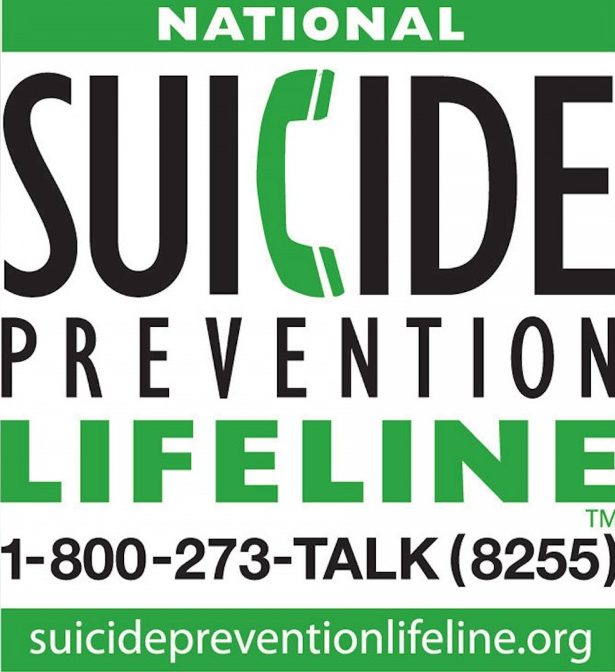Stressed out: Students feeling more anxious than ever before
One in five U.S. adults experiences some form of mental illness, but only half seek help
November 17, 2017
This article was prepared by the Simpsonian’s Jetstream Team, consisting of Alex Kirkpatrick, Emily Carey, Randy Paulson and Austin Hronich.
*Editor’s note:
Time and time again, we’ve seen unfortunate instances in which cases of mental illnesses are not treated, resulting in tragic circumstances.
For so long, discussion of mental health seemed taboo in our culture. It makes people uncomfortable, or there’s a fear that discussing suicide might trigger copycat suicides.
But recently, there’s been some progress. Whether you loved it or hated it, the popular Netflix series “13 Reasons Why” fostered a nationwide discussion and network news coverage.
You don’t have to like the show to appreciate the fact that parents began talking to their children about what’s going on at school, or that there was a 23 percent increase in the number of Google searches for “suicide hotline.”
Also, Logic’s song featuring Alessia Cara and Khalid, “1-800-273-8255,” which is also the phone number for the National Suicide Prevention Lifeline, reached No. 3 on the Billboard charts, and the music video has been seen nearly 150 million times on YouTube.

So there’s progress. But there needs to be more discussion about mental health, especially at the local level.
Jetstream interviewed four Simpson College students who were willing to share their stories of depression and anxiety in the hopes that their message will reach someone who needs it.
You can watch the video above.
STRESSED OUT
Simpson College is not immune to the mental health crisis plaguing the state of Iowa as more and more students seek counseling services.
Ellie Olson, director of counseling services, said winter is the busiest time of the year, and there has been a marginal but “noteworthy” increase in the number of counseling sessions over the years.
Olson said about 11 percent of the student population used counseling services when she started at Simpson 11 years ago; that number has since increased to 17 percent.
This could be due to counseling services’ prevalence on campus and a feeling of comfort among students who are struggling to reach out for help, but Olson said it could also be a generational issue.
“There is data out there that people are more anxious and stressed than they used to be, both on our campus and more broadly speaking,” she said. “I would suspect that is part of why we see more people coming in, too.”
STATE OF CRISIS
In the United States, one in five adults experiences at least some degree of mental illness each year, according to the National Institute of Mental Health.
But the Substance Abuse and Mental Health Services Administration found that in 2014, only about half of adults suffering from a mental illness within that past year actually received treatment for it.
Especially in Iowa, the state of mental health care is in poor shape. Iowa was ranked one of the worst states in the country for mental health care in terms of psychiatric beds provided, according to a report from the Treatment Advocacy Center Office of Research and Public Affairs.
The report said Iowa had only 1.2 beds per 100,000 adults in 2016. Since that data was collected, the report said Iowa has shut down two of its four state mental health institutions.
Additionally, the report noted that despite legislation passed in May that would help counties fund mental health services, “There is little state-level information regarding formal programming to supervise or treat individuals with severe mental illness who have committed major crimes.”
“I think that the closing of mental health beds is something that has impacted us certainly here at Broadlawns,” Dr. Janice Landy, psychiatrist and chief of inpatient behavioral health at Broadlawns Medical Center in Des Moines, told KCCI.
“We have seen an uptick in the number of patients who are hospitalized here for significantly longer periods of time,” she said. “And the sort of domino effect is that then we have fewer beds and access for people who have very acute symptoms.”
Landy said depression in particular is a common psychiatric illness which most people either struggle with personally or know somebody who does. Since there is a stigma associated with seeking care, Landy said people with depression may not always get treatment.
When it comes to college campuses, anxiety and depression continue to be the greatest mental concern among college students, according to a 2016 report from the Center for Collegiate Mental Health.
Counselors and professionals said there are a number reasons for a rise in depression and anxiety among college students.
ALL ABOUT THE MONEY
As college students pull their hair out stressing over final exams before going home for winter break, a very real and dreadful aspect of higher education looms: student loan debt.
Olson said financial and academic stresses, as well as connectivity issues, weren’t as problematic with previous generations.
In a recent lifestyle survey from Sodexo, U.S. students are more worried about paying for their degrees than ever before, and they fear dropping out because of affordability concerns.
Seven out of 10 college students worry about personal finances, according to a new study from Ohio State University’s Center for the Study of Student Life. Moreover, nearly one-third of students reportedly neglected their studies because of the money they owed.
This year, outstanding student loan balances nationwide surpassed an exorbitant $1.31 trillion, an upward trend that shows no sign of receding.
Students have a bad track record of paying back their debt, data from the Federal Reserve Bank of New York show. In the fourth quarter of 2016, 11.2 percent of all student loan debt was either 90 or more days delinquent or in default, surpassing auto loans (around 4 percent delinquent) and credit card loans (around 7 percent delinquent).
Experts say refinancing loans could make student loan payments smaller because it reduces the interest rate.
Despite the overwhelming stress that burdens students, the OSU study found that three-fourths of students still think an investment in higher education is wise.
FACEBOOK AND THE FEAR OF MISSING OUT
There are numerous studies that confirm social media usage has been linked to mental health issues. But experts say it’s not the presence of sites like Facebook and Twitter that cause anxiety — it’s how you use them.
“Social media has us more connected in ways that are positive, and in some ways, social media and our culture and social climate keep the connections that we have at a surface level,” Olson said.
Humans thrive on social interactions, but a review published in ScienceDirect found that an excessive use of social media is often associated with addiction, anxiety, depression, body image and alcohol use.
Olson sees more students coming in seeking deeper connections in their life and with the people around them. “The absence of those connections very much contributes to overall well-being and mental health,” she said.
Close relationships and connections act as positive reinforcement and support emotionally and mentally. Some students are having issues transitioning to the seemingly fast-paced and never-ending college life.
“We are also a culture that is very ‘go, go, go’ and do everything that we can all the time,” Olson said. “It doesn’t really teach people about emotions, or how to be quiet or how to sit still.”
“We reward people for being busy constantly and for not getting a lot of sleep and doing everything they can for every minute of their time,” she added.
This is an unrealistic expectation that’s been put upon this culture, especially among college students.
“This idea of ‘if I’m not being productive, this is not time well spent’ is a problem,” Olson said. “That really contributes to anxiety and stress.”
INFORMATION OVERLOAD
We’re a year removed from the 2016 presidential election, but emotions still run high — whether you’re a Democrat or a Republican.
In the age of President Donald Trump, young adults are more stressed out when it comes to political topics, according to an October study published by University of California at Los Angeles’ Institute for Democracy, Education and Access.
Stress has particularly increased where there are fewer white students. Students reported that they feel chastised when discussing differing political views or that they’ve lost friends over hot-button issues.

“There have been other intense periods of American political discourse,” said Kedron Bardwell, professor of political science at Simpson, “but this was to a level and to a height of intensity that I haven’t really seen before.”
The UCLA study also found that the nation’s current political climate has become more “threatening,” “bellicose” and “uncivil”; as a result, students tend to suffer socio-emotional and academic consequences.
“I think it is a level of stress they’re experiencing surrounding politics that has certainly increased,” Bardwell said.
Bardwell said the president’s apparent unpredictability adds to the overall political tension.
“This is not a normal thing,” Bardwell said. “Normally, people wouldn’t be worrying about those things if a typical president was in office, but certainly it’s changed the dynamic.”
“The news media has given heightened attention to this, and when the news media is paying attention to it 24/7, it’s hard not to, as a student who follows politics, also get sucked into following it 24/7,” he said.

Perhaps not surprisingly, predominately white schools have become more hostile environments to minority groups.
This month, “It’s OK to be white” posters began springing up on college campuses across the country, which were meant to gin up far-right ideologies, the Washington Post reported.
In Creston, a photo surfaced earlier this fall showing several high school students posing in white hoods resembling Ku Klux Klan attire and waving a Confederate flag next to a burning cross.
Earlier this spring, KCCI reported that a group of Valley High School students – clad in red, white and blue – allegedly mocked their rivals, the more notably diverse North High School, at a basketball game.
There is speculation that a Trump presidency has sparked a rise in hate crimes and racial tension. And a 24-hour news cycle might contribute to people’s feelings of anxiety.
“There’s two angles to that: One is maybe what’s going on politically, and the other is students thinking a little more consciously about how they take in information and being careful about where they get their information and how much of their time they spend being immersed in that information,” Bardwell said.
Students should make conscious choices about how much time they’re spending on Facebook and Twitter feeds, Bardwell said. Instead of engaging in the latest political outrage or scandal, students should make sure they take care of their own mental health.
WORKING ON A SOLUTION
Hope for Iowa mental health care has not been lost.
After an 18-year-old Iowan named Sergei Neubauer took his own life in September after battling with depression and post-traumatic stress disorder, the topic of mental health took on a greater urgency for state legislators, according to a recent Des Moines Register column.
Since the teenager’s death, his mother, Mary Neubauer, has been active in urging the state to take action regarding mental health.
The story of her son’s death has prompted Iowa’s 2018 gubernatorial candidates to hold a Dec. 5 forum focusing on mental health at Des Moines University. The medical school plans to step up efforts on mental health care and announced it would develop an intensive training course on mental health care that will be mandatory for third-year students.
At Broadlawns, Landy said the hospital is expanding the amount of care it will be able to provide to its patients. It recently added 14 psychiatric beds to its facilities.
“There is a huge amount of morbidity and mortality that goes along with untreated depression, so we’re very happy to be able to offer some state-of-the-art care for that disorder,” Landy said. “In general, access to psychiatric beds is a nationwide problem, but certainly something that we struggle with here in Iowa as well.”
Members of the Student Government Association said they’re working on giving students a mental health education series, the first of which happened Nov. 3 and covered stress and time-management tactics.
They’re also working on approving a 24-hour mental health hotline, which would then go through a two-month installment process.
The process could be delayed if it’s not implemented by February, SGA representative James Simmons told The Simpsonian. The current organization, ProtoCall, has more than 100 clinicians who take about 500,000 calls a year nationally, but it’s costly and caters to larger universities.
In the meantime, there are steps that students can take to help out friends in need.
“If you notice that they’re struggling, I always encourage friends to check in with one another and to let friends know what they’re noticing,” Olson said. “If you notice that your friend is more irritable, spending more time in bed, not getting to class, ask about those things.”
“Be direct with those friends, say, ‘I care, and I notice, what’s up?’ and let them respond,” she added.
It’s important not to make assumptions about others struggling with a mental health issue. Just ask and listen.
“Offer support in the ways that you can, but also be aware of the things you are not able to do,” Olson said. “You are not a counselor, you can’t fix someone’s depression and you are not the best resource to fix someone’s depression.”
Experts say accessibility remains the No. 1 reason why people who struggle with mental health issues don’t seek help, but prevention can also be key.
If you suffer from depression or anxiety, health professionals recommend that you do the following:
– Take a break
– Balance your diet
– Limit your alcohol and caffeine intake
– Get enough sleep
– Exercise regularly
– Be involved
– Make attainable goals
– Call the National Suicide Prevention Lifeline at 800-273-8255
To schedule an appointment with a counselor, students can call 515-961-1332 or email [email protected].
The Simpsonian’s Taia Veren contributed to this article.
___
The Simpsonian’s Jetstream Team consists of four reporters and staff members dedicated to in-depth and investigative reporting on Simpson College’s campus and student-related subjects.
If you have a tip, please contact these representatives of Jetstream:
Alex Kirkpatrick, Jetstream Editor
Alex is a senior majoring in multimedia journalism and minoring in French.
Email: [email protected]
Emily Carey, Digital Media Manager
Emily is a junior majoring in multimedia journalism and theater.
Email: [email protected]
Randy Paulson, Senior Staff Reporter
Randy is a junior majoring in multimedia journalism and minoring in Spanish.
Email: [email protected]
Austin Hronich, Director of Photography
Austin is a junior majoring in sports communication.
Email: [email protected]








